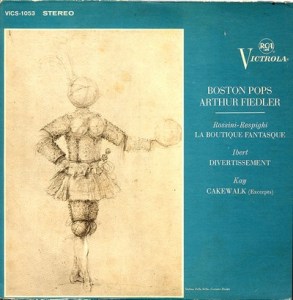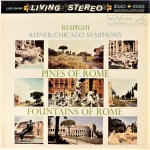 More music conducted by Fritz Reiner
More music conducted by Fritz Reiner
Reviews and Commentaries for The Pines of Rome
We did a monster shootout for this music in 2021, one we had been planning for more than twenty years. On hand were quite a few copies of the Reiner on RCA; the Ansermet on London; the Maazel on Decca and London (the Decca being on the TAS List), the Kempe on Readers Digest, and quite a few others we felt had at least the potential to sound good.
Allow me to back up a bit.
In the late-’70s, when I first started paying attention to the TAS Super Disc List, I read about the Pines of Rome with 1S stampers. I could never find one, and the Shaded Dogs and Red Seals that I did find never sounded all that good to me.
I know now that I did not have the stereo system back then (equipment, room, etc.) that could reproduce a recording of such difficulty.
In the ’80s, the Mobile Fidelity pressing of the Pines of Rome, like all of their classical releases, without exception, never sounded right to me either.
It was certainly better than the Classic Records release from 1995 of the Reiner Pines. That record was just too harsh sounding, with the shrill strings that Bernie Grundman was cutting on practically every title put out by that awful label. I fell for some of them — I actually raved about Witches’ Brew on Classic back then, an endorsement that mortifies me to this day — but most of their classical records were junk that I was selling for cheap to the audiophiles who fell for the favorable reviews written about Classic Records in the magazines. Some things never change!
In the ’90s, the Decca on Speakers Corner came along and sounded fine to me. Not great, but good enough to sell if you wanted a good, quiet Pines for $30. It might not be fair to blame Speakers Corner for the shortcomings of their pressing, since the vintage Deccas with Maazel we’ve played have pretty much the same problems as the modern heavy vinyl classical LP: smeary strings, and an obvious lack of depth and transparency
In 2006 we played a Red Seal pressing of LSC 2436 that we liked at the time, but that was on a darker and less revealing system. It was a year before we found out about the amazing Walker Enzyme Record Cleaning System, which came along in 2007 and changed everything for us.
Around 2010 we played what we thought was a fairly good sounding London with Ansermet conducting, but by 2016 that recording was no longer competitive. A nice old record, but the world is full of nice old records. We had set our sights on a Hot Stamper pressing of a great recording with a performance to match. It would take us another six years of wandering in the wilderness before we were finally able to find what we were looking for.
Cut to 2016
In 2016 we we began a serious survey of the recordings we had on hand, close to a dozen different performances I think, and found them all wanting, save three: this one (which is still on the TAS List), a Reader’s Digest pressing with Kempe (our second favorite), and a London with Kertesz.
Distortion
If a particular performance had any distortion or limitation problems in the higher frequencies, it was quickly rejected out of hand. Same with low end whomp and weight. On these works both are crucial.
No other pieces of music of which we are aware have so much going on up high and down low. This narrowed the field of potential Hot Stampers considerably. Great performances by top conductors could not get over these hurdles — high and low — time and time again.
For these reasons, it took us years to find the right recordings. We knew the Reiner would be hard to beat, but we kept trying record after record hoping that we could find one to wrest the crown away from what is widely considered the greatest recording of the works ever made.
We never did find something better. Our best Shaded Dog ended up winning the shootout. The best RCA pressings were doing everything right. There was plenty of top end, with virtually no harmonic distortion, and when I say plenty, I mean the right amount. Not many engineers managed to get all the highs correctly onto the tape, but Lewis Layton nailed it — in 1960!
What to Listen For
So many recordings had screechy strings and sour horns. When the music would get loud, and both the Pines and the Fountains get very loud indeed, assuming the recording will let it, the sound would become unbearably harsh and unpleasant. This is the opposite of what should happen, and it was obvious that those recordings would not make it past the first round.
All three of the finalists could claim enthusiastic performances with powerful energy and top quality orchestral playing. Still, with the best copies going head to head with each other, Reiner’s recording had more of all the qualities we were looking for.
How did the famous 1S/1S pressing fare? No idea. I haven’t seen one in twenty years. It may be better than the White Hot copy we are offering here. I certainly would not make the mistake of saying what it sounds without having played it. If someone has one and wants to send it to me to audition, I will love to give it a spin.
Some recordings we played lacked transparency, as well as the relaxed sense of involvement that eases one’s ability to be tricked into thinking “you (really) are there.”
The famous 1977 Maazel recording for Decca, which was on the TAS List for a long time, suffered from a bad case of multi-miking and the transparency issue mentioned above. What do you expect from 1977?
This is of course the knock on the Modern Heavy Vinyl Pressing – where is the transparency? The space? The three-dimensional depth? If your stereo can reproduce these qualities — a big if, since even as recently as twenty years ago mine could not — you should have given up on these opaque and airless frauds years ago.
Our Difficulty of Reproduction Scale
This album is especially Difficult to Reproduce. Do not attempt to play it on anything but the highest quality equipment.
Classical music is unquestionably the ultimate test for proper turntable / arm / cartridge setup. The Pines of Rome would be a superb choice for adjusting tracking weight, VTA, azimuth and the like.
One of the reasons $10,000+ front ends exist is to play large scale, complex, difficult-to-reproduce music such as these two tones poems. You don’t need to spend that kind of money to play this record, but if you choose to, it would surely be the kind of record that can show you the sound your tens of thousands of dollars has bought you.
It has been my experience that cheap tables (anything under $1k would be my guess) more often than not collapse completely under the weight of a mighty record such as this.
If you have one of those, this is probably not the record for you.
Or if it is a record that interests you, time to go turntable shopping.
(more…)
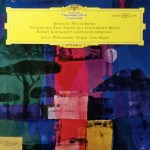


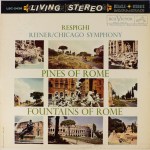
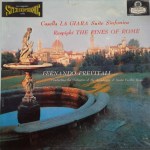
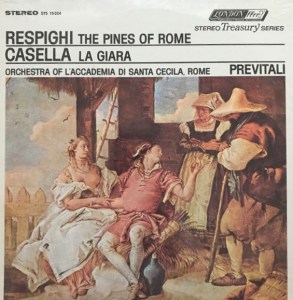

 More music conducted by Fritz Reiner
More music conducted by Fritz Reiner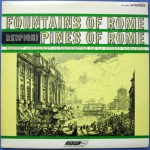

 Around 2016 we surveyed the recordings of the work we had on hand, close to a dozen different performances I think, and found them all wanting, save three: the Reiner (which is still on the
Around 2016 we surveyed the recordings of the work we had on hand, close to a dozen different performances I think, and found them all wanting, save three: the Reiner (which is still on the
